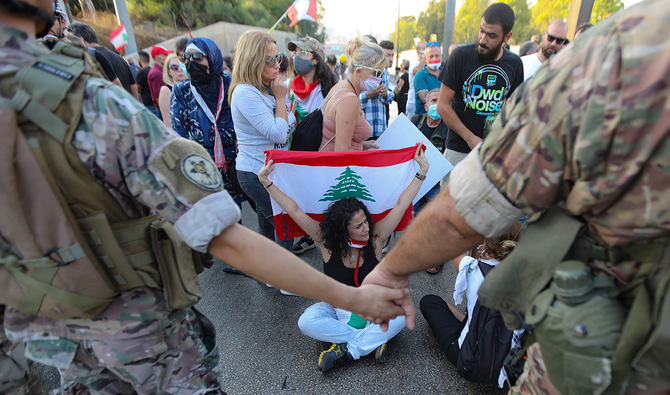BEIRUT: Lebanese President Michel Aoun held crisis talks with rival parliamentary factions on Tuesday in a last-ditch bid to form a new government on the eve of a deadline agreed with France.
The move follows Amal Movement and Hezbollah’s refusal to rotate the finance portfolio — a key part of French President Emmanuel Macron’s initiative to form a “mission government” within 15 days.
Failure to meet Tuesday’s deadline will be a blow to French efforts to secure an agreement from Lebanon’s politicians on anti-corruption reforms.
Macron has made clear that wide-ranging reforms are needed in return for emergency foreign aid needed amid soaring unemployment and the country’s worst economic crisis in decades.
France’s Foreign Ministry said Lebanese politicians needed to deliver on their promise to agree on the formation of a new Cabinet.
“It is up to them to translate this commitment into action without delay,” a spokesman said.
However, Aoun’s crisis talks on Tuesday appeared to end without any progress in solving the impasse.
The Presidential Palace did not set an appointment for the prime minister-designate Mustapha Adib to meet the president and discuss a Cabinet lineup.
Hezbollah and Amal Movement MPs Mohammed Raad and Ali Hassan Khalil told Aoun on Tuesday that both factions are determined to hold on to the finance portfolio.
The Lebanese Forces and the Progressive Socialist party blocs led by Walid Jumblatt failed to take part in the talks.
Future Movement official Mustafa Alloush described the discussions led by the president as a breach of the country’s constitution.
“What matters now is to form a government in order to reach an internal truce while awaiting the important positions in the region, such as the US presidential election,” he told Arab News.
“Everyone should reconcile and pursue the French initiative since there is no another alternative,” he added.
French efforts to push through widespread government reforms followed the Port of Beirut explosion that devastated the capital, killing almost 200 people and injuring thousands.
Party officials who met with Macron in Beirut in the wake of the blast pledged to form a government of specialists and nonpolitical ministers to implement reforms demanded by the international community in order to salvage Lebanon from its growing economic crisis.
Amid the political tug-of-war, tensions between Free Patriotic Movement (FPM) and Lebanese Forces followers boiled over on the streets of the capital early on Tuesday when shots were fired in the air, forcing troops to step in and quell the violence.
The Lebanese army command said: “A clash between supporters of political parties led to shots being fired in the air after a number of Lebanese Forces followers gathered near the FPM headquarters, hurled stones and shouted provocative slogans.”
The army called for people to “express opinions peacefully, and refrain from anything that disrupts stability and security.”
Lebanese Forces supporters commemorated the group’s founder, Bachir Gemayel, a former president of the country, with a convoy in the streets.
Former Lebanese Forces’ MP Fadi Karam said that “the FPM’s relations are shaky with all political components, not only with the Lebanese Forces. The FPM’s relationships are broken and have no future.”
He said that “clashes between enthusiastic young people can happen, but an investigation is needed to hold those who fired the shots accountable.”
















